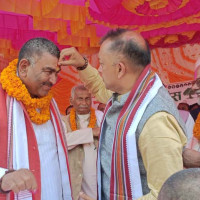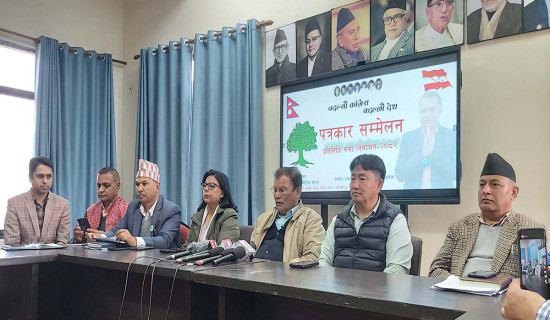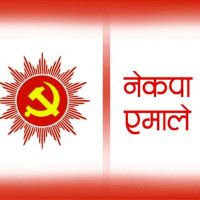- Sunday, 15 February 2026
Govt plans to complete exploration of five critical minerals within this fiscal
Kathmandu, Aug. 30: The government is set to complete the exploration of five industrial minerals in various locations across the country within current Fiscal Year 2024/25.
According to the Reform Action Plan of the Ministry of Industry, Commerce and Supplies (MoICS), 2081 published by the ministry on Wednesday, exploration of limestone, dolomite, kaolin, phosphorite and iron will be completed by the end of this fiscal, mid-July 2025.
The Department of Mines and Geology (DMG) said that these are the products that have the potential to propel industrial development so the exploration work will be conducted by the internal technicians and engineers.
“The Department has allocated budget for the exploration of these minerals. Since primary study on the feasibility of exploration and deposits has already been conducted, further work can be conducted on time,” said Narayan Banskota, Senior Divisional Geologist of the DMG.
Currently iron extraction is being conducted in Dhaubadi of Nawalparasi (East) by the state-run company Dhaubadi Iron Company Limited. Further exploration of iron will be conducted in Rukum (East).
Likewise, the country has iron deposits in Jelbang of Rolpa, Jhumlabang of Rukum (East) and Those of Ramechhap. However, Jumlabang is said to have more than 200 million tonnes of hematite deposit, making it a lucrative project for mining and industries.
The DMG is in the final stage of conducting the chemical test of the iron retrieved from the site in Rukum (East).
Exploration of dolomite will be conducted in Dhading and Tanahun districts, and additional study on phosporite exploration will be taken up in Baitadi district. Dolomite is used in cement and bitumen mixes instead of limestone while phosporite is used in animal feed, detergents, fertilisers, herbicides and other industrial products.
Similarly, limestone exploration is underway in Udayapur district which has a reputation of having a high quality of the product. The exploration site is nearby Jaljale, where the limestone mine of the Udayapur Cement Industry is located.
Likewise, kaolin exploration will be completed in various areas of Madhes Province and other Tarai districts, informed Baskota. Kaolin is a kind of clay that is used in making tiles and similar products.
Meanwhile, the Action Plan of the MoICS, has set out the plan to complete the petroleum drilling work in Dailekh, prepare the Detailed Project Report (DPR) of the Dhaubadi iron mine, and complete petroleum exploration in other blocks within this year.
Nepal has 10 identified petroleum exploration blocks – Dhangadhi, Karnali, Nepalgunj, Lumbini, Chitwan, Birgunj, Malangawa, Janakpur, Rajbiraj and Biratnagar, which are assigned with number from 1 to 10, respectively.
The MoICS is also set to issue license for the six mineral sites that have the deposits of limestone, iron and copper oars.
To expedite the industrial development, the Ministry has laid out the plans to implement various development works at the proposed new industrial zones including Laxmipur, Daiji, Naubasta, Motipur, Shaktikhor and Mahurdhap, and Special Economic Zones (SEZ) in Panchkhal of Kavre and Simara of Bara.
“A proposal will be forwarded to lease out the SEZ in Panchkhal and Simara (Block B and C) to operate them in public-private-partnership model,” mentions the action plan.
It has also proposed the formulation of various policy and legal instruments for micro, cottage and small enterprise, startups, industrial villages, business incubators, inustrial investment promotion and corporate social responsibility. Standardisation rules wil be implemented for the use of raw materials, contract manufacturing and production and branding of micro-brewaries.
In terms of trade facilitaion, a master plan for trade logistics will be formulated. Dry port at Timure in Rasuwa and Integrated Check Post at the Nepal-India border in Bhairahawa will be completed.
Likewise, the country will prepare a strategy for trade promotion in at least three countries, conduct bilateral dialogue with India to review the Trade Treaty, sign trade agreements with Bangladesh and Bhutan, and sign trade and investment framework agreements with South Korea and Vietnam.



-original-thumb.jpg)













